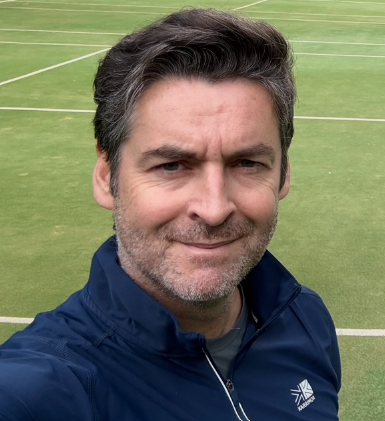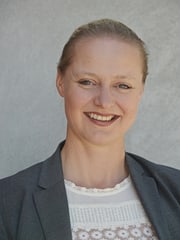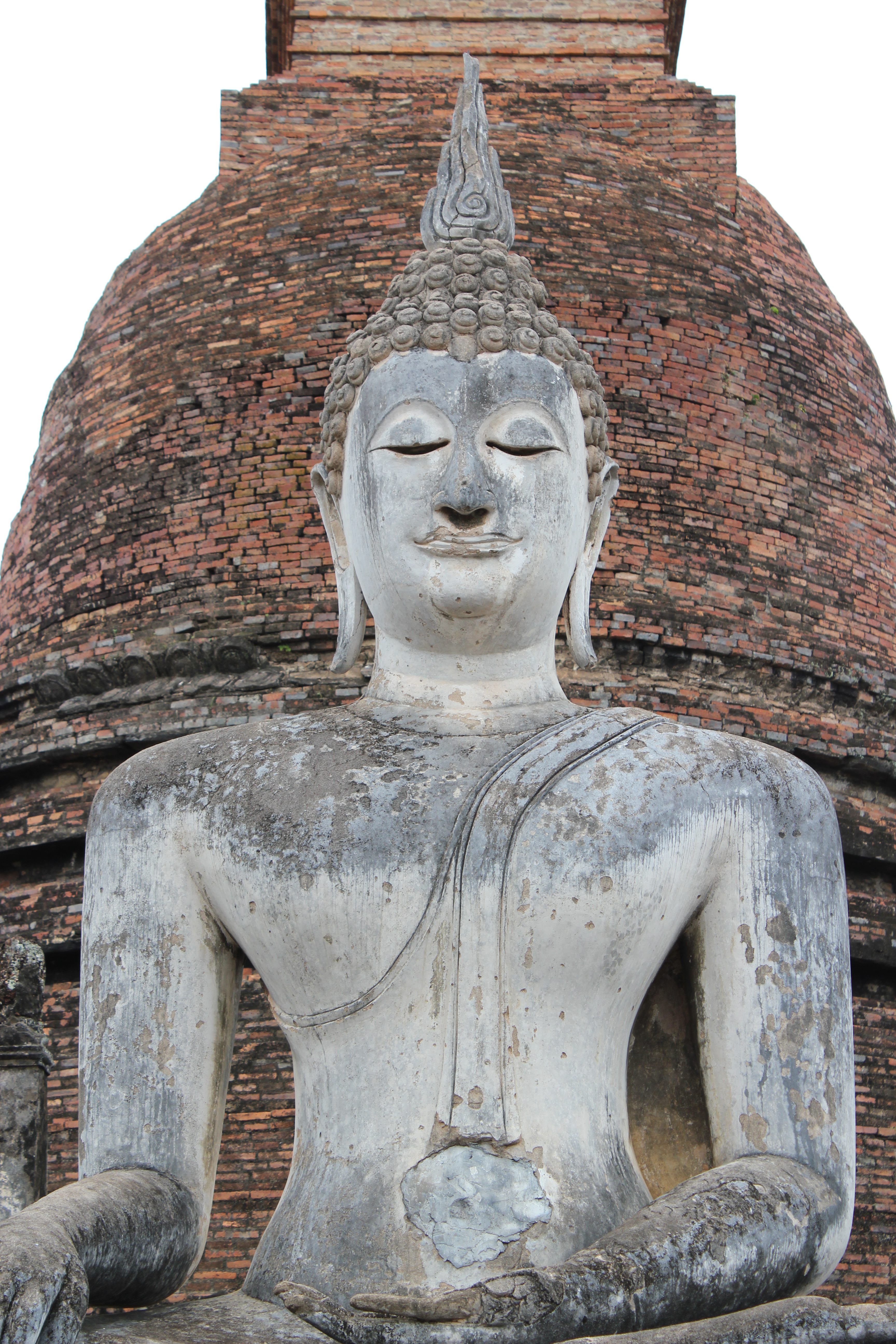Veranstaltungen
Early Buddhism and the Origins of the Mahāyāna
A Lecture by Dr. Alex Wynne, Senior Academic Consultant at the Oxford Centre for Buddhist Studies
December 17, 2025, 4:15 pm, Asia-Africa-Institute, East Wing (ESA O 120) and online, for online participation please register via eventbrite
This lecture will present a new thesis on the origin of Mahāyāna Buddhism, based on a reassessment of early Buddhist teaching. It will claim that the old paradigm, of the emergence of the ‘Perfection of Wisdom’ (prajñāpāramitā) from Abhidharma thought, is not supported by the textual evidence. Instead, it will be argued that the true background to the Prajñāpāramitā, and to early Mahāyāna in general, is to be located in two early Buddhist trends: first, apophatic or ‘no view’ teachings, strongly stated in the Pāli Aṭṭhakavagga (‘Book of Eights’) and related texts; and second, mythic ‘Bodhisatta’-style teachings which articulate the idea of a long and irreversible path to enlightenment over numerous lifetimes. The early tension and interaction between these two forms of spirituality explains the earliest sections of the oldest Mahāyāna text: the Aṣṭasāhasrikā or ‘short’ Prajñāpāramitā.
 Alexander Wynne is a Chief Editor at the Dhammachai Tipiṭaka Project, Thailand, which is preparing a critical of the Pāli canon, and Senior Academic Consultant at the Oxford Centre for Buddhist Studies. He received a DPhil from the University of Oxford in 2004, and has published extensively on early Buddhist thought and practice.
Alexander Wynne is a Chief Editor at the Dhammachai Tipiṭaka Project, Thailand, which is preparing a critical of the Pāli canon, and Senior Academic Consultant at the Oxford Centre for Buddhist Studies. He received a DPhil from the University of Oxford in 2004, and has published extensively on early Buddhist thought and practice.
Buddhist responses to the 2021 military coup in Myanmar
A Lecture by Prof. Dr. Iselin Frydenlund, MF Norwegian School of Theology, Religion and Society
December 03, 2025, 4:15 pm, ESA Ost, Room 120 and online - for online participation please register via eventbrite
The military coup in Myanmar on 1 February 2021 ended a period of semi-civilian rule (2011–2021), bringing the country once again under direct military rule. Recent research into the religious responses to the coup in its early phases indicates that the mass protests were characterised by global internet culture, inter-religious solidarity, and new visions for a plural and democratic Myanmar. The Buddhist Sangha, it is often claimed, remained silent and was mainly supportive of the military. In this talk I argue that this narrative is too simplistic, ignoring both changes in attitudes over time, as well as internal divisions within the Sangha. Rather, what we see is both monastic justification of the military's action and resistance to it. Moreover, I will also make the case that Buddhist support for the coup must be understood not only within an instrumentalist framework or within what we can refer to as the "Military-monastic complex", but also through a specific "Buddhist Ideology of Order." In opposition to this, a Buddhist revolutionary movement is identified. It envisions radical societal transformations, including of institutional Buddhism itself. Finally, I will discuss the ways in which pro-revolutionary activities go well beyond established monastic revolutionary networks, indicating broader Sangha engagement in the Myanmar Spring Revolution than has often been assumed.

Dr. Iselin Frydenlund is professor of the Study of Religions at MF Norwegian School of Theology, Religion and Society and a Fellow of the MF Centre for the Advanced Study of Religion (MF CASR). She specializes in questions relating to Buddhism and its societal impact, focusing on Buddhism, politics, nationalism and violence in Sri Lanka and Myanmar. She also works on Buddhist-Muslim relations in Buddhist majority states in Asia and was the PI of the Research Council of Norway-funded research project INTERSECT (“Intersecting Flows of Islamophobia”). Since 2016 she has also been heading an academic exchange program between MF and Myanmar Institute of Theology. Frydenlund regularly appears in national and international media on questions related to Buddhism and politics, and she frequently provides analysis for policy-makers home and abroad. Her latest book is Buddhist-Muslim Relations in a Theravada World (Palgrave Macmillan, 2020), co-edited with Michael Jerryson. Her monograph on Buddhism as a political force in Asia will soon appear for the Scandinavian University Press.
The Dharma of Giving and the Giving of the Dharma: Social and Soteriological Implications of Teachings on Dāna from a Buddhist Heaven
A Lecture by Prof. Dr. Daniel Stuart, University of South Carolina
November 19, 2025, 4:14 pm, Asia-Africa-Institute, East Wing (ESA O 120) and online, for online participation please register via eventbrite
This talk explores a narrative episode in a middle period Buddhist sūtra, the Saddharmasmṛtyupasthānasūtra to explore implications of teachings on giving (dāna). The narrative presents readers with the motif of the karma mirror, utilized in this instance by the king of the Heaven of the Thirty-three Gods, Śakra/Indra, to teach the inhabitants of his realm about low, middling, and high forms of giving and their karmic effects. By elucidating how these teachings are articulated in the text, this talk shows how internal Buddhist debates on giving involved tensions between different kinds of Dharma teachers and around the goals of Dharma teaching at social and soteriological levels of concern.
 Daniel M. Stuart is Associate Professor in the Department of Religious Studies at the University of South Carolina. He holds an MA in Sanskrit Literature and a PhD in Buddhist Studies from the University of California, Berkeley. His research examines the history and transformation of Buddhist contemplative practices from premodern South Asia to the global present. He is the author of Thinking about Cessation (2013), A Less Traveled Path (2015), The Stream of Deathless Nectar (2017), S. N. Goenka: Emissary of Insight (2020), and Insight in Perspective (2024). Daniel M. Stuart is currently a fellow of the Alexander-von-Humboldt Stiftung at Hamburg University.
Daniel M. Stuart is Associate Professor in the Department of Religious Studies at the University of South Carolina. He holds an MA in Sanskrit Literature and a PhD in Buddhist Studies from the University of California, Berkeley. His research examines the history and transformation of Buddhist contemplative practices from premodern South Asia to the global present. He is the author of Thinking about Cessation (2013), A Less Traveled Path (2015), The Stream of Deathless Nectar (2017), S. N. Goenka: Emissary of Insight (2020), and Insight in Perspective (2024). Daniel M. Stuart is currently a fellow of the Alexander-von-Humboldt Stiftung at Hamburg University.
Nandapañño’s Bicāraṇā Ālambanasaṅgaha (1638 CE): Toward an Intellectual History of Northern Thai Exegesis
A lecture by Trent Walker (Postdoctoral Fellow, Ho Center for Buddhist Studies at Stanford University)
Date and time: 24. Mai 2023, 4:15 pm
Venue: ZOOM Online-lecture. Registration required via eventbrite
The late fifteenth and early sixteenth centuries have long been described as a golden age of Lanna or Northern Thai intellectual culture. Most of the key works by Lanna authors in Pali, including the impressive oeuvres of Sirimaṅgala and Ñāṇakitti, were composed prior to the establishment of Burmese suzerainty in 1558. By contrast, we know almost nothing about the intellectual culture of the late sixteenth and early seventeenth centuries. This lecture seeks to change that by revealing how new exegetical techniques were developed by Lanna monks and lay scholars during the first century of Burmese rule.
Rather than writing exclusively in Pali, the leading exegetes of this period pioneered a distinctive bitextual Pali-Lanna style that drew on their deep erudition in and fidelity to Indic commentarial norms. My focus is on an autographed composition by the former monk Nandapañño of Chiang Saen in 1638, namely his Bicāraṇā Ālambanasaṅgaha. This elegantly carved one-fascicle manuscript offers a learned excursus on a short section from the Abhidhammatthasaṅgaha and its ṭīkā, the Abhidhammatthavibhāvinī. By situating Nandapañño’s work within the context of other Pali-Lanna and Pali-Lao Abhidhamma commentararies inscribed between 1553 and 1638, I show how his use of bitextual analysis, ingenious mnemonics, and extensive quotations from scholastic and grammatical treatises reflects how Buddhist exegesis became a bilingual affair in the century that followed Lanna’s golden age.
 Trent Walker is a Postdoctoral Fellow at the Ho Center for Buddhist Studies and a Lecturer in Religious Studies at Stanford University. He holds a Ph.D. in Buddhist Studies from the University of California, Berkeley, and has published widely on Khmer, Lao, Pali, Thai, and Vietnamese Buddhist texts and recitation practices. He is the author of Until Nirvana’s Time: Buddhist Songs from Cambodia and the co-editor of Out of the Shadows of Angkor: Cambodian Poetry, Prose, and Performance through the Ages, both published in 2022. In Fall 2023, he will be Assistant Professor of Theravada Buddhism at the University of Michigan.
Trent Walker is a Postdoctoral Fellow at the Ho Center for Buddhist Studies and a Lecturer in Religious Studies at Stanford University. He holds a Ph.D. in Buddhist Studies from the University of California, Berkeley, and has published widely on Khmer, Lao, Pali, Thai, and Vietnamese Buddhist texts and recitation practices. He is the author of Until Nirvana’s Time: Buddhist Songs from Cambodia and the co-editor of Out of the Shadows of Angkor: Cambodian Poetry, Prose, and Performance through the Ages, both published in 2022. In Fall 2023, he will be Assistant Professor of Theravada Buddhism at the University of Michigan.
A recording of this lecture can be found here.
Achtsamkeit – Zwischen Selbstoptimierung und ethischem Handeln
Online-Vortragsreihe, organisiert vom Numata-Zentrum für Buddhismuskunde der Universität Hamburg und Netzwerk Ethik heute
Nach unserer Vortragsreihe „Achtsamkeit – kritischer Blick auf einen Trend“ im Wintersemester 2016/17 widmen wir uns im Sommersemester 2022 einer weiteren kritischen Frage: Gibt es eine ethische Dimension von Achtsamkeit?
 Je nach Absicht der Praktizierenden kann Achtsamkeit im Dienste einer egoistischen Selbstoptimierung oder des Gewahrseins existenzieller Verbundenheit stehen. Kann Achtsamkeit prosoziales Verhalten fördern oder bedarf es dazu weiterer Faktoren wie etwa der Schulung von Mitgefühl? Welche Effekte der Achtsamkeitspraxis in Bezug auf moralisches Handeln sind empirisch tatsächlich nachweisbar? Gibt es eventuell negative Auswirkungen, gar Unvereinbarkeiten? Und wie geht die Forschung mit solchen Fragestellungen um?
Je nach Absicht der Praktizierenden kann Achtsamkeit im Dienste einer egoistischen Selbstoptimierung oder des Gewahrseins existenzieller Verbundenheit stehen. Kann Achtsamkeit prosoziales Verhalten fördern oder bedarf es dazu weiterer Faktoren wie etwa der Schulung von Mitgefühl? Welche Effekte der Achtsamkeitspraxis in Bezug auf moralisches Handeln sind empirisch tatsächlich nachweisbar? Gibt es eventuell negative Auswirkungen, gar Unvereinbarkeiten? Und wie geht die Forschung mit solchen Fragestellungen um?
Die drei Online-Abende widmen sich diesen Fragen in drei Vorträgen aus verschiedenen Disziplinen und laden zur Reflexion und Diskussion über die Verbindung von Achtsamkeit und Ethik ein.
28. April: Ariadne von Schirach: Cui bono? Achtsamkeit zwischen Spiritualität und Selbstoptimierung
10. Mai: Anne Böckler-Raettig: (Wie) Kann Meditation soziales Verstehen und Verhalten fördern?
2. Juni: Simon Schindler: Mehr Moral und Nächstenliebe? Ein achtsamer Blick auf den Achtsamkeit-Hype
jeweils 18.15 Uhr
Ort: online über Zoom
Anmeldung: Bitte melden Sie sich formlos per E-Mail an: anmeldung@ethik-heute.org( anmeldung"AT"ethik-heute.org). Den Zoom-Link zur jeweiligen Veranstaltung erhalten Sie kurz vor dem Termin per E-Mail.
Flowers in the Mirror - A Reexamination of Gunavarman's Biography
A lecture by Xuan Fang, Institute for the Study of Buddhism and Religious Theory, Renmin University of China
May 25, 2023, 18:15 - 19:45 Uhr, Room 123, Asien-Afrika-Institut, ESA Ost (Edmund-Siemers-Allee 1)
This lecture may also be viewed online. Please register via eventbrite.
Ven. Guṇavarman is the only Tripiṭaka Master in the history of Chinese Buddhism who explicitly self-claimed to have attained the stage of Sakṛdāgāmin. His travels and influence span the three major Buddhist cultural regions of North-west India, South Asia, and East Asia. As we can see from Chinese records, he resided in Shepo 阇婆 (Java) in the late 4th and early 5th centuries and had an important impact on Buddhism in Java at that time. However, the nature of his Buddhist teachings and practices, and their impact on Javanese Buddhism, as well as how they should be understood in the context of exchanges among the three major Buddhist cultural circles at that time, have not been thoroughly explored in previous studies. Undoubtedly, these issues are crucial for understanding the nature of early Javanese Buddhism and its interaction with other Buddhist cultural circles in Asia, particularly Jibin or Chi-pin 罽宾 (Gandhāra-Kapiśa).
This lecture aims to present a tentative answer to these questions by reflecting on current academic studies of Northwest Indian Buddhism in the 5th century and conducting a more in-depth study of the "Biography of Guṇavarman", as given in the Gaosengzhuan 高僧传(Biographies of Eminent Monks)of the 6th century. By cross-checking relevant records from other sources, we can try to understand the nature of the Buddhist teachings and practices that Guṇavarman transmitted and propagated, and their relationship with the different Buddhist traditions of that time, with regard to three aspects: the scriptures he translated, his paintings during his stay in Shixing 始兴, and the meditative approaches he practiced. The speaker argues that Guṇavarman was most likely a member of the Dharmaguptaka school, which refutes the traditional view in the academic community that he belonged to the Sarvāstivāda school, and that the Buddhism brought to Java by Guṇavarman had Mahāyāna elements. Finally, the speaker discusses the different narratives between Guṇavarman’s biography and autobiographical sketches embedded in the former. The talk ends with an analysis of Guṇavarman’s different images in the three major Buddhist cultural regions.
 Xuan Fang is an associate professor at the Department of Religious Studies, Renmin University of China, and a research fellow of the Institute for the Study of Buddhism and Religious Theory. Mr. Xuan has been a guest professor at many domestic institutions of Buddhist studies, he is also an editorial board member of various academic journals. Currently, he is a visiting scholar at Hamburg University.
Xuan Fang is an associate professor at the Department of Religious Studies, Renmin University of China, and a research fellow of the Institute for the Study of Buddhism and Religious Theory. Mr. Xuan has been a guest professor at many domestic institutions of Buddhist studies, he is also an editorial board member of various academic journals. Currently, he is a visiting scholar at Hamburg University.
Mr. Xuan's research areas mainly focus on Buddhist philosophy, the theory and practice of Buddhist meditation, and modern and contemporary Chinese Buddhism, particularly Humanistic Buddhism.
